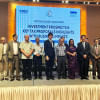Japanese companies prefer Bangladesh
In its latest survey of Japanese companies operating in Asia and Oceania, Japan External Trade Organisation (JETRO) took inputs from CEOs of more than 9,500 Japanese companies in 20 countries over October and November, 2015. The results point to both favourable and unfavourable conditions. On the positive side, we find that Bangladesh leads over Vietnam, Sri Lanka, Thailand and Pakistan on cost factors and the country offers a far better wage advantage than other Asian countries like China, India to name but a few. Business confidence of Japanese firms scored a healthy 63.3 points pointing to a favourable business performance in the current fiscal. With 67 per cent of respondents stating that they are likely to expand their operations in Bangladesh over the next two years.
However, the country is perceived to be lagging behind in connectivity and problems with worker productivity have been highlighted. Lack of free trade agreements between Bangladesh and Association of South East Asian Nations (ASEAN) is seen as a hurdle since Japanese industry has a large footprint in ASEAN. Had there been such deals in place, Bangladesh could look at serious Japanese investments for producing intermediary products to be shipped to plants in ASEAN where the final products could come together.
We have our set of problems with regulatory issues where "investment friendly" policies have been highlighted as a major hindrance to Japanese FDI. These are issues that can only be addressed at policy level and doing so could open the gates for meaningful investments from Asia's second largest economy.

 For all latest news, follow The Daily Star's Google News channel.
For all latest news, follow The Daily Star's Google News channel. 








Comments